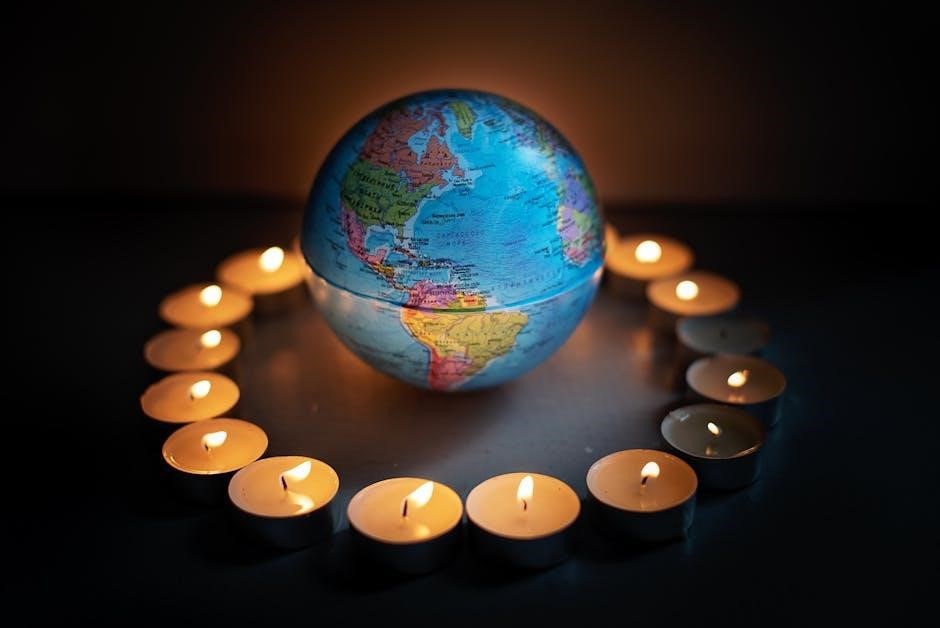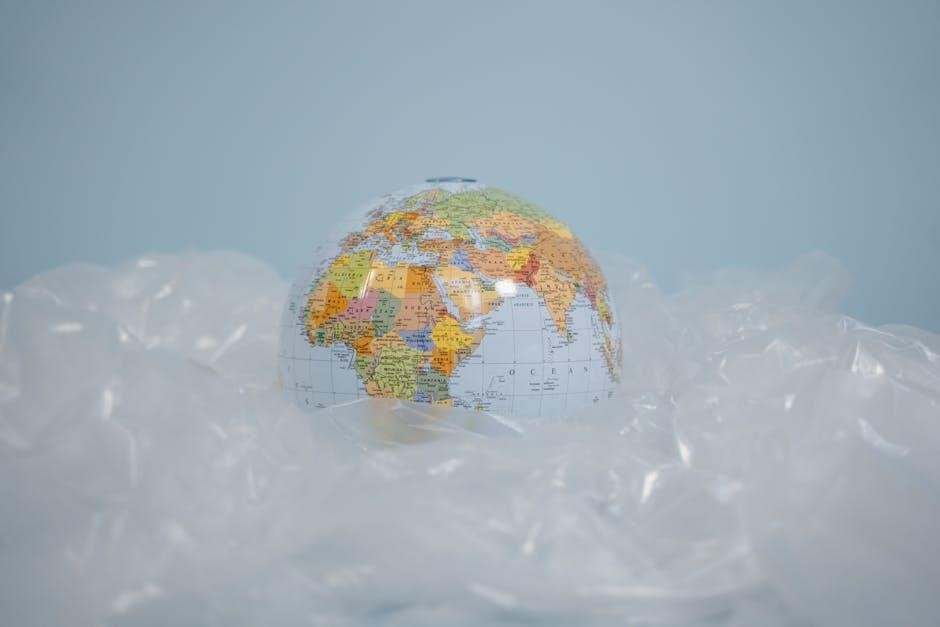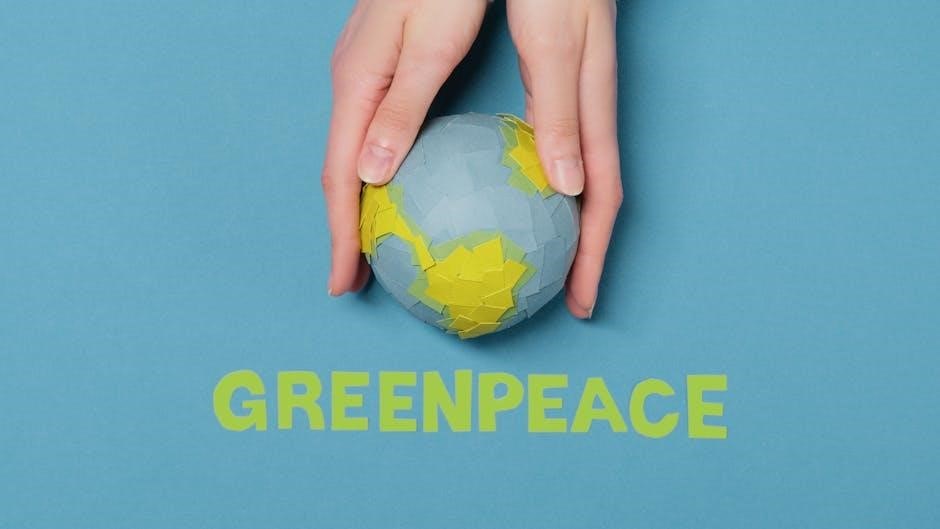Geopolitics explores how political, economic, and cultural factors shape global power dynamics, offering insights into a rapidly changing world and its complexities.
Defining Geopolitics in the Modern Context
Geopolitics in the modern context is the study of how political, economic, and cultural factors shape global power dynamics and territorial strategies. It examines how nations navigate a rapidly changing world, influenced by globalization, technological advancements, and shifting alliances. Geopolitical analysis focuses on understanding the interplay between physical geography, resources, and state power, offering insights into conflicts, cooperation, and the pursuit of national interests. In a multipolar world, geopolitics helps make sense of the complexities of international relations, providing frameworks to analyze emerging challenges and opportunities. It is an interdisciplinary field, drawing from history, economics, and sociology to explain the evolving nature of global governance and competition.
The Evolution of Geopolitical Thought
Geopolitical thought has evolved significantly over time, shaped by shifting global power structures and intellectual traditions. Early theories, influenced by figures like Mackinder and Mahan, focused on physical geography and territorial control. Classical geopolitics emphasized the importance of land, resources, and strategic locations in determining state power. The Cold War era introduced ideological dimensions, with geopolitics becoming a tool for understanding superpower rivalries and containment strategies. In the post-Cold War period, globalization and the rise of non-state actors challenged traditional notions of sovereignty and territoriality. Today, geopolitical thought incorporates diverse perspectives, including critical approaches that examine the role of culture, identity, and economic interdependence. This evolution reflects the dynamic nature of global politics and the need for adaptive frameworks to interpret an increasingly complex world.

The Changing Global Power Structure
The global power structure is shifting from unipolarity to multipolarity, with BRICS nations rising and U.S. dominance waning, reshaped by globalization’s dual effects.
Rise of Multipolarity and Decline of Unipolarity
The global power structure is undergoing a significant shift, with multipolarity emerging as the new world order, challenging the long-standing unipolar dominance of the United States. The rise of BRICS nations—Brazil, Russia, India, China, and South Africa—symbolizes this transformation, as these countries assert their influence in geopolitics and economics. Globalization has accelerated this shift, creating interdependence while fostering cultural and economic exchanges. However, this multipolar world also brings complexities, such as resource competition and ideological tensions. The decline of unipolarity reflects a world where no single nation can dictate global outcomes unilaterally, prompting a need for multilateral cooperation to address shared challenges like climate change and economic inequality. This shift underscores the dynamic nature of geopolitics in a rapidly changing world.
Emerging Powers and Their Geopolitical Roles
Emerging powers, such as the BRICS nations (Brazil, Russia, India, China, and South Africa), are reshaping the global geopolitical landscape. These countries are leveraging their economic growth, natural resources, and strategic locations to assert influence on the world stage. China, for instance, has become a dominant player in trade and infrastructure development, while India is emerging as a key actor in technology and regional security. Similarly, Russia’s geopolitical maneuvers in energy markets and regional conflicts highlight its role as a significant power. These nations are challenging traditional Western dominance, fostering a multipolar world where diverse voices shape global decisions. Their rise underscores the importance of understanding their roles in addressing contemporary geopolitical challenges and opportunities.
Key Concepts in Contemporary Geopolitics
Contemporary geopolitics encompasses globalization, multipolarity, and the clash of civilizations, shaping a dynamic world order where power, identity, and resources redefine international relations and strategies.
Geopolitical Theories and Their Relevance Today
Geopolitical theories, such as realism, liberalism, and constructivism, remain pivotal in understanding global dynamics. Realism emphasizes state power and competition, while liberalism focuses on cooperation and institutions. Constructivism highlights the role of cultural and ideological factors in shaping international relations. These frameworks provide lenses to analyze contemporary issues like the rise of multipolarity, the decline of unipolarity, and the impact of globalization. They help explain how states navigate a complex world, balancing economic interests, security concerns, and cultural identities. The relevance of these theories lies in their ability to offer insights into the motivations and strategies of global actors, aiding policymakers in making informed decisions. By integrating these perspectives, scholars and practitioners can better comprehend the evolving geopolitical landscape and its challenges.
The Role of Globalization in Shaping Geopolitical Landscapes
Globalization has profoundly influenced geopolitical landscapes by fostering interconnectedness among nations. It has created new opportunities for economic cooperation and cultural exchange, yet also intensified competition for resources and markets. The rise of multinational corporations and digital technologies has shifted power dynamics, enabling emerging economies to challenge traditional hegemonies. Globalization has also led to the emergence of transnational issues, such as climate change and pandemics, which require multilateral solutions. While it has promoted interdependence, it has simultaneously highlighted inequalities and sparked tensions between globalists and nationalists. Thus, globalization remains a double-edged sword, reshaping the world order and compelling states to adapt to its evolving challenges and opportunities.

Regional Geopolitical Hotspots
Regions like Eastern Europe, the Middle East, and North Africa remain volatile, with conflicts in Ukraine, Libya, Syria, and Yemen shaping global stability and power dynamics.
Eastern Europe and the Ukrainian Conflict
The Ukrainian conflict has become a pivotal geopolitical flashpoint, reshaping alliances and triggering economic sanctions. It reflects deeper tensions between Russia and the West, with historical and cultural underpinnings influencing current dynamics. The conflict has redrawn regional power structures, accelerating Europe’s energy and security diversification. Meanwhile, humanitarian crises and infrastructure devastation underscore the human cost of geopolitical rivalry. This conflict also highlights the role of international organizations in mediating disputes and the challenges of maintaining global stability amid shifting power balances. As the situation evolves, it continues to shape the future of Eastern Europe and beyond, illustrating the complex interplay of history, culture, and power in modern geopolitics.
The Middle East and Geopolitical Rivalries
The Middle East remains a hotspot of geopolitical competition, driven by resource control, ideological conflicts, and strategic interests. Regional powers like Saudi Arabia, Iran, and Turkey vie for influence, while global actors such as the United States, Russia, and China navigate shifting alliances. Historical tensions, ethnic divisions, and religious ideologies fuel ongoing conflicts, from Syria to Yemen. The region’s energy reserves and critical trade routes amplify its geopolitical significance. Meanwhile, non-state actors like Hezbollah and ISIS further complicate the landscape. This intricate web of rivalries underscores the Middle East’s central role in shaping global power dynamics and international relations, making it a focal point for geopolitical analysis and strategy.

The Role of International Organizations
International organizations like the EU and BRICS play pivotal roles in shaping global governance, fostering cooperation, and addressing geopolitical challenges, influencing policy-making and international relations.
The European Union as a Geopolitical Actor
The European Union (EU) has emerged as a significant geopolitical actor, influencing global governance through collective policies and strategic partnerships. Its role extends beyond Europe, shaping international relations and addressing global challenges like climate change and economic inequality. The EU’s geopolitical influence is rooted in its economic strength, diplomatic cohesion, and commitment to multilateralism. By fostering cooperation among member states, the EU navigates the complexities of a multipolar world, advocating for democracy and human rights. Its initiatives, such as the European Green Deal and Digital Strategy, demonstrate its ability to adapt to global shifts and lead in critical areas. The EU’s geopolitical actorness is further enhanced by its ability to balance internal unity with external influence, making it a key player in shaping the future world order.
BRICS and the Shifting Global Order
BRICS (Brazil, Russia, India, China, South Africa) represents a coalition of emerging economies challenging the traditional global power structures. This grouping seeks to redefine international relations by promoting multipolarity and South-South cooperation. The BRICS nations aim to counterbalance Western-dominated institutions, advocating for reforms in global governance, such as the expansion of the UN Security Council and the International Monetary Fund. Their collective efforts in establishing the New Development Bank and the Contingent Reserve Arrangement highlight their commitment to financial independence. BRICS countries are leveraging their combined economic and political weight to influence key issues like trade, climate change, and technology. This shift underscores the transition from a unipolar to a multipolar world, with BRICS playing a pivotal role in reshaping the global order.

Geopolitics and the Future World Order
Geopolitics will shape the transition to a multipolar world, where emerging powers like BRICS challenge traditional dominance, influenced by technological advancements and globalization.
The Impact of Technological Advancements on Geopolitics
Technological advancements are reshaping global power dynamics, creating new opportunities and challenges. Artificial intelligence, cybersecurity tools, and renewable energy solutions are transforming how nations project power and secure resources. These innovations enable emerging powers to challenge traditional geopolitical hierarchies, fostering a multipolar world. However, they also introduce risks, such as cyber warfare and ethical dilemmas surrounding AI. As nations adapt, technological prowess becomes a critical determinant of geopolitical influence, driving competition and collaboration. This era demands strategic foresight to navigate the complexities of a tech-driven world order, where adaptability and innovation will define future global leadership.
Navigating a Multipolar World: Challenges and Opportunities
A multipolar world presents both challenges and opportunities. The decline of unipolarity fosters greater diversity in global governance, enabling emerging powers to influence international relations. However, this shift also leads to increased competition and potential conflicts over resources and influence. Nations must adapt by forming strategic alliances and embracing multilateralism to address shared challenges like climate change and economic inequality. This new order demands diplomacy, cooperation, and innovative solutions to balance competing interests. While the transition brings uncertainties, it also offers chances for more equitable global systems and inclusive decision-making processes, reshaping the future of international relations in profound ways.

Leave a Reply
You must be logged in to post a comment.